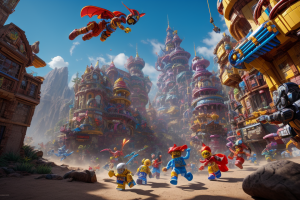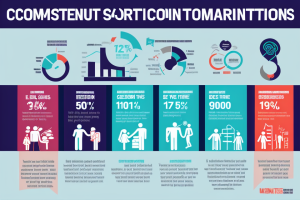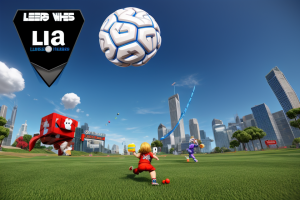
“Ah, the joy of toddlerhood! A time of discovery, wonder, and… toy battles? Yes, that’s right! As parents, we’ve all been there – watching our little ones grab, push, and shove each other over a toy. But is this behavior normal? Is it just a part of growing up, or should we be concerned? In this article, we’ll explore the causes and consequences of toy battles in toddlers, and give you some tips on how to handle this common – but sometimes challenging – aspect of early childhood.”
Yes, it is normal for toddlers to fight over toys as they are still learning how to share and manage their emotions. The causes of toy battles can include a lack of empathy, limited understanding of possession, and a desire for control. The consequences of toy battles can include increased aggression, a lack of cooperation, and difficulty sharing. However, there are ways to reduce toy battles, such as setting clear rules and boundaries, providing plenty of opportunities for sharing, and teaching alternative ways to express feelings.
What Causes Toy Battles Among Toddlers?
Developmental and Social Factors
As toddlers navigate the complex world of social interactions, they are constantly learning how to share, regulate their emotions, and interact with others. These developmental and social factors contribute to the occurrence of toy battles among toddlers.
Learning to Share
Sharing is a critical aspect of social development in toddlers. At this stage, they are still learning how to share and take turns with toys, which can lead to conflicts over possession. The desire to control and possess toys is natural for toddlers, as they are developing a sense of ownership and autonomy. However, their limited ability to understand the perspective of others can lead to conflicts when sharing toys.
Emotional Regulation
Emotional regulation is another critical aspect of social development in toddlers. They are still learning how to manage their emotions and may become easily frustrated or upset when they cannot have their way. This can lead to outbursts and conflicts over toys, as they may feel a strong desire to possess a particular toy at a specific moment.
Social Interactions
Social interactions play a significant role in toy battles among toddlers. They are learning how to interact with others and may not have developed the necessary social skills to navigate conflicts effectively. Toddlers may struggle with communication, empathy, and cooperation, which can contribute to toy battles. They may also have difficulty understanding the perspective of others and may become easily agitated when their expectations are not met.
Overall, toy battles among toddlers are a normal part of their social and developmental journey. However, it is essential for parents and caregivers to provide guidance and support to help toddlers learn how to share, regulate their emotions, and interact with others in a positive and constructive manner.
Toy Characteristics
Toddlers’ fascination with toys is driven by several factors, which can lead to conflicts over toy possession. Here are some of the key characteristics of toys that contribute to toy battles:
Scarcity
One of the primary reasons for toy fights is the scarcity of desired items. When there are limited toys available, toddlers may become more territorial and protective of the toys they possess. This scarcity can be due to a lack of toys in the environment or multiple children vying for the same toys. In such situations, toddlers may feel the need to assert their dominance or protect their resources, leading to conflicts over toy possession.
Attractiveness
Another factor contributing to toy battles is the attractiveness of certain toys. Some toys may be more visually appealing or stimulating to toddlers due to their colors, sounds, or textures. These attractive toys can create competition among toddlers, who may want to possess them and exclude others from playing with them. The allure of these toys can result in conflicts as toddlers may struggle to gain control of them or protect them from others.
Durability
The durability of toys can also play a role in toy battles. Toys that are sturdy and long-lasting may be more desirable to toddlers, as they can withstand rough play and continue to provide entertainment over an extended period. However, this durability can also lead to conflicts, as toddlers may perceive these toys as more valuable and worth fighting for. The enduring appeal of these toys can create tension among toddlers, who may try to defend them or take them away from others.
Environmental Factors
Toddlers are still learning how to share and interact with others, and their behavior is often influenced by their environment. Environmental factors can contribute to toy battles among toddlers in several ways.
Limited Space
One common environmental factor that can lead to toy battles is limited space. When toddlers are playing in a small room or area, they may feel confined and territorial. This can lead to disagreements over who gets to use certain toys or play areas.
Overstimulation
Another environmental factor that can contribute to toy battles is overstimulation. When toddlers are exposed to too many stimuli at once, such as loud noises, bright lights, and a variety of toys, they may become overwhelmed and more likely to engage in conflicts with others. This is because they may feel a need to assert their dominance or control over their environment.
Unstructured Playtime
Finally, unstructured playtime can also contribute to toy battles among toddlers. When toddlers are left to their own devices without any adult supervision or guidance, they may become more focused on obtaining and possessing toys, rather than sharing and playing together. This can lead to disputes and conflicts over toys.
Overall, environmental factors can play a significant role in the development of toy battles among toddlers. By understanding these factors, parents and caregivers can take steps to create a more supportive and positive environment for toddlers to play and learn.
How to Minimize Toy Battles
Encouraging Cooperation
Encouraging cooperation among toddlers is a crucial step in minimizing toy battles. This approach involves promoting a sense of empathy, understanding, and fairness among children. By fostering these qualities, toddlers can learn to play together without resorting to physical altercations.
Sharing Positive Experiences
Sharing positive experiences is an effective way to encourage cooperation among toddlers. When children engage in enjoyable activities together, they are more likely to develop a sense of camaraderie and mutual respect. As a result, they may be less inclined to fight over toys, as they are more focused on having fun and building friendships.
Setting Clear Limits
Setting clear limits is another important aspect of encouraging cooperation among toddlers. Establishing rules and boundaries helps children understand what is acceptable behavior and what is not. By setting limits, parents can prevent conflicts from escalating and teach toddlers to resolve disputes in a more constructive manner.
Reinforcing Fair Play
Reinforcing fair play is essential in minimizing toy battles. By praising and rewarding children for sharing and taking turns, parents can encourage positive behavior and discourage selfish actions. Additionally, modeling fair play behavior can have a significant impact on how toddlers interact with one another, as they are more likely to mimic the actions of their caregivers.
In conclusion, encouraging cooperation among toddlers is a crucial step in minimizing toy battles. By fostering a sense of empathy, understanding, and fairness, parents can help children learn to play together without resorting to physical altercations. Through sharing positive experiences, setting clear limits, and reinforcing fair play, parents can create a safe and enjoyable play environment for their toddlers.
Managing Emotions
Managing emotions is a crucial aspect of minimizing toy battles among toddlers. By teaching them how to handle their emotions, you can reduce the likelihood of conflicts arising over toys. Here are some strategies for managing emotions in toddlers:
Validating Feelings
Validating your child’s feelings is the first step in managing their emotions. It’s essential to acknowledge their feelings and let them know that their emotions are valid. When a toddler feels heard and understood, they are more likely to feel comfortable expressing their emotions, which can help prevent conflicts over toys.
For example, if your child is upset because their sibling took their favorite toy, you can say, “I understand that you’re upset because your sister took your toy. It’s okay to feel that way.”
Modeling Appropriate Behavior
Modeling appropriate behavior is another effective strategy for managing emotions in toddlers. Toddlers learn by observing their caregivers, so it’s essential to model healthy emotional expression and conflict resolution. When you express your emotions in a healthy way, your child is more likely to do the same.
For example, if you’re frustrated because your child is fighting over a toy, you can take a deep breath and say, “I understand that you both want the toy, but we need to find a way to share it.”
Teaching Emotional Regulation
Teaching emotional regulation skills is another effective strategy for managing emotions in toddlers. Emotional regulation refers to the ability to manage one’s emotions in a healthy way. By teaching your child emotional regulation skills, you can help them manage their emotions when they feel upset or frustrated.
One effective strategy for teaching emotional regulation is to use storybooks that focus on emotions. You can read books that illustrate different emotions and talk to your child about how the characters in the book might be feeling. You can also teach your child deep breathing exercises or other relaxation techniques to help them calm down when they feel upset.
Overall, managing emotions is a crucial aspect of minimizing toy battles among toddlers. By validating your child’s feelings, modeling appropriate behavior, and teaching emotional regulation skills, you can help your child manage their emotions in a healthy way and reduce the likelihood of conflicts arising over toys.
Toy Selection and Environmental Modification
Choosing Age-Appropriate Toys
One of the most effective ways to minimize toy battles is by selecting age-appropriate toys for your toddler. Children have different developmental stages, and toys that are suitable for their age group will promote their cognitive, physical, and emotional growth. For instance, infants should be provided with toys that encourage them to grasp and chew, while toddlers need toys that stimulate their imagination and creativity. Therefore, it is essential to consider the developmental stage of your child when selecting toys to avoid conflicts over toys that are not suitable for their age.
Ensuring Sufficient Space
Another way to minimize toy battles is by ensuring that your child has sufficient space to play with their toys. When toddlers do not have enough space to play with their toys, they tend to become possessive of their belongings, which can lead to conflicts with other children. Therefore, it is important to provide your child with a designated play area where they can keep their toys and play without interference from other children. This can help reduce the likelihood of toy battles and promote a sense of ownership and responsibility in your child.
Establishing a Routine
Establishing a routine can also help minimize toy battles. When children have a set routine, they know what to expect, and this can help reduce the likelihood of conflicts over toys. For instance, you can create a routine where your child puts away their toys at the end of each play session. This can help prevent conflicts over toys that may arise when your child wants to play with a particular toy but cannot find it. Additionally, routines can help your child develop a sense of order and structure, which can help them manage their emotions and behavior.
The Consequences of Toy Battles
Emotional Impact
Insecurity
Toddlers often struggle with their sense of self-worth and feel insecure about their abilities and possessions. Fighting over toys can exacerbate these feelings, making children question their own worth and value. This insecurity can manifest in other areas of their lives, such as social interactions and relationships, as they grow older.
Aggression
The constant battles over toys can also lead to increased aggression in toddlers. They may become more prone to lashing out at others, whether physically or verbally, as they feel the need to defend their possessions. This aggressive behavior can be detrimental to their social development and can lead to difficulties in forming healthy relationships later in life.
Shame
Toddlers who frequently engage in toy battles may also experience feelings of shame. They may feel ashamed of their behavior and the reactions it elicits from others, such as anger or disappointment. This shame can contribute to a negative self-image and low self-esteem, which can have long-lasting effects on their emotional well-being.
Understanding the emotional impact of toy battles is crucial for parents and caregivers. It is important to address the root causes of these conflicts and to provide toddlers with the tools they need to cope with their emotions in a healthy and constructive manner. By doing so, toddlers can develop stronger emotional resilience and a more positive self-image, which can contribute to their overall well-being and success in life.
Social Development
Fighting over toys can have a significant impact on a toddler’s social development. Understanding the causes and consequences of these toy battles can help parents guide their children towards healthier interactions with others.
Conflict Resolution
Toddlers who engage in frequent toy battles may struggle with conflict resolution later in life. These early experiences can shape their beliefs about how to handle disagreements and conflicts, which may manifest in problematic behaviors if not addressed.
Cooperation
Cooperation is a crucial aspect of social development, and toy battles can hinder this process. When toddlers fight over toys, they learn that aggression and self-interest are effective ways to get what they want. This can make it difficult for them to cooperate with others and work towards shared goals.
Empathy
Empathy is the ability to understand and share the feelings of others. Toy battles can discourage empathy in toddlers, as they may prioritize their own desires over the feelings and needs of others. This can lead to difficulties in forming and maintaining relationships throughout their lives.
To mitigate the negative consequences of toy battles, parents should encourage their toddlers to develop essential social skills such as conflict resolution, cooperation, and empathy. By providing a supportive environment and modeling positive behaviors, parents can help their children learn to navigate social situations more effectively.
Behavioral Implications
Aggression is a common behavioral implication of toy battles among toddlers. The constant struggle for control over toys can lead to an increase in physical aggression, such as pushing, hitting, and biting. This type of aggression can have a negative impact on the toddler’s social development, as well as their relationships with peers and caregivers.
Defiance
Toddlers who engage in toy battles may also exhibit defiance towards authority figures, such as parents or caregivers. This can manifest in refusal to share toys, disobedience, and challenging rules or boundaries. Over time, this defiance can become a pattern of behavior that is difficult to break, leading to problems with authority figures and a lack of respect for rules and boundaries.
Withdrawal
Another behavioral implication of toy battles is withdrawal. Some toddlers may become so frustrated with the constant fighting over toys that they withdraw from social interactions altogether. This can lead to isolation, a lack of trust in others, and difficulty forming meaningful relationships with peers.
Overall, the behavioral implications of toy battles can have a significant impact on a toddler’s social and emotional development. It is important for caregivers to understand these implications and take steps to address them in order to promote healthy social interactions and positive relationships with others.
Supporting Your Toddler Through Toy Battles
Building Emotional Resilience
Toddlers are still learning how to regulate their emotions, and fighting over toys is often a manifestation of their developing emotional resilience. As a parent, you can support your toddler’s emotional growth by building their emotional resilience. Here are some ways to do that:
Encouraging Expression
One of the most important things you can do to help your toddler build emotional resilience is to encourage them to express their feelings. This means creating a safe space where your toddler feels comfortable talking about their emotions, whether it’s positive or negative feelings. You can encourage expression by asking open-ended questions, such as “How did you feel when your friend took your toy?” or “What can we do to make you feel better?” By giving your toddler the space to express their emotions, you’re helping them develop the vocabulary they need to communicate their feelings.
Normalizing Emotions
Another way to build your toddler’s emotional resilience is to normalize their emotions. This means helping them understand that it’s normal to feel a range of emotions, including sadness, anger, and frustration. You can normalize emotions by talking about your own feelings and explaining that everyone experiences emotions differently. For example, you might say, “I feel sad when I have to leave my friend’s house too,” or “I know it’s frustrating when you can’t have the toy you want.” By normalizing emotions, you’re helping your toddler understand that their feelings are valid and that everyone experiences them.
Modeling Adaptive Coping Strategies
Finally, you can help your toddler build emotional resilience by modeling adaptive coping strategies. This means showing them healthy ways to deal with their emotions, such as taking deep breaths, talking to a trusted adult, or engaging in a calming activity. You can model adaptive coping strategies by using them yourself when you’re feeling overwhelmed or frustrated. For example, you might take a few deep breaths before responding to your toddler’s behavior, or you might suggest that you both take a break and engage in a calming activity, such as reading a book or going for a walk. By modeling adaptive coping strategies, you’re showing your toddler that it’s okay to feel emotions and that there are healthy ways to deal with them.
Enhancing Social Skills
Role-Playing
Role-playing is a valuable tool in enhancing your toddler’s social skills. It involves engaging your child in activities that simulate real-life situations, such as sharing toys or resolving conflicts. This method helps children develop empathy, communication, and problem-solving skills, as they practice navigating social interactions.
Storytelling
Storytelling is another effective way to help your toddler develop social skills. Sharing stories about characters who encounter conflicts and learn to resolve them can help your child understand the importance of sharing, cooperation, and compromise. This technique also encourages your child’s imagination and creativity, fostering a deeper connection to the stories and the lessons they convey.
Play Therapy
Play therapy is a form of psychotherapy that uses play to communicate with and help people, especially children, to resolve psychological challenges and achieve personal growth. It allows your toddler to express their feelings and needs through play, helping them develop emotional intelligence and self-awareness. Play therapy can also provide an opportunity for your child to practice social skills in a safe and supportive environment, facilitated by a trained therapist.
Facilitating Healthy Play
When it comes to toy battles, it’s important to understand that these conflicts are a normal part of your toddler’s development. As they learn to assert their independence and navigate social interactions, it’s not uncommon for toddlers to become highly emotional and territorial over their belongings, including toys. However, there are ways to help your toddler develop healthy play habits and reduce the frequency of toy battles.
Sharing Toys
One of the most effective ways to reduce toy battles is to teach your toddler the importance of sharing. By modeling sharing behaviors and encouraging your toddler to share their toys with others, you can help them develop empathy and understand that others also have feelings and needs. You can also teach your toddler to share by introducing them to the concept of “turn-taking,” where they take turns playing with a toy with another child.
Taking Turns
Teaching your toddler to take turns is another important aspect of facilitating healthy play. This involves modeling taking turns and using positive reinforcement when your toddler takes turns with others. By making taking turns a routine part of playtime, your toddler will learn to value the time and needs of others and be less likely to become territorial over their toys.
Compromising
Compromising is another key aspect of healthy play. When toddlers are involved in a toy battle, it’s important to teach them to find a compromise that satisfies both parties. This can involve finding alternative solutions, such as sharing the toy for a limited amount of time or finding a substitute toy for one of the children. By teaching your toddler to compromise, you can help them develop problem-solving skills and reduce the frequency of toy battles.
In summary, facilitating healthy play is an important aspect of supporting your toddler through toy battles. By teaching your toddler to share, take turns, and compromise, you can help them develop important social and emotional skills that will serve them well throughout their life.
Seeking Professional Help
Therapy
When toddlers frequently engage in toy battles, it may be beneficial to seek professional help. Therapy can provide support for both the child and the parents. Play therapy is an effective approach for young children, as it allows them to express their feelings and learn how to manage their emotions through play. Cognitive-behavioral therapy can also be helpful in teaching children coping strategies and alternative ways to handle conflicts.
Consultation
Consulting with a pediatrician or a child development specialist can provide valuable insight into the causes of toy battles and offer guidance on how to address the issue. These professionals can assess the child’s overall development and provide recommendations for strategies to reduce conflict and promote sharing. They can also offer support and advice to parents on how to manage their own reactions during toy battles and provide resources for further assistance.
Support Groups
Joining a support group can be a helpful resource for parents navigating the challenges of toy battles. These groups provide a safe space for parents to share their experiences, discuss strategies, and receive support from others who are going through similar situations. Online support groups or local parenting groups can be great places to find resources and connect with other parents who are facing similar challenges. Additionally, attending workshops or classes on parenting and child development can provide valuable information and tools for addressing toy battles and promoting positive social interactions between siblings or playmates.
FAQs
1. Is it normal for toddlers to fight over toys?
Yes, it is normal for toddlers to fight over toys. This behavior is a natural part of their development as they learn to assert their independence and express their emotions. However, it is important for parents to understand the underlying causes of this behavior and provide appropriate guidance to help their child learn to share and resolve conflicts peacefully.
2. Why do toddlers fight over toys?
Toddlers fight over toys for a variety of reasons. One of the main reasons is that they are learning to assert their independence and want to have control over their surroundings. They may also be trying to express their emotions, such as frustration or jealousy, and may not have the verbal skills to express themselves in other ways. Additionally, toddlers may fight over toys because they are interested in the same toy and want to play with it at the same time.
3. How can I prevent toy battles between my toddlers?
There are several strategies you can use to prevent toy battles between your toddlers. One approach is to supervise their play and intervene when necessary to mediate conflicts and encourage sharing. You can also set clear rules and boundaries for toy sharing and make sure that each child has access to a variety of toys to play with. Additionally, providing opportunities for your toddlers to engage in parallel play, rather than joint play, can help reduce the likelihood of conflicts over toys.
4. What should I do if my toddlers are fighting over a toy?
If your toddlers are fighting over a toy, it is important to intervene in a calm and assertive manner. You can try to distract them by offering alternative toys or activities, or you can try to mediate the conflict by helping them take turns with the toy or finding a compromise that satisfies both children. It is important to set clear expectations for behavior and reinforce positive interactions between your toddlers.
5. Is it okay to take away a toy as punishment for fighting over it?
It is generally not recommended to take away a toy as punishment for fighting over it. This approach may only reinforce the child’s desire to hold onto the toy and may not address the underlying causes of the conflict. Instead, it is important to focus on teaching your child how to share and resolve conflicts peacefully. You can set clear expectations for behavior and provide positive reinforcement for sharing and cooperative play.







